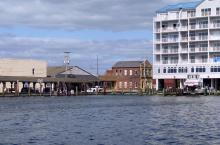Choptank Electric to Bring Broadband to Maryland's Eastern Shore Following New Law and Membership Vote
Almost 54,000 electric cooperative residents will see the benefits of a statewide law change in Maryland after a summer filled with changes. After a state vote to allow deregulation, Choptank Electric, which serves member owners across nine counties in Maryland’s Eastern Shore, voted in August to become member-regulated so that the cooperative can pursue broadband projects in a part of the state that has long suffered from poor or no connectivity options.
A State Law and a Membership Vote
The process unfolded earlier this year, when representatives for the co-op spoke with the legislature in Annapolis about offering broadband to its members. State law at the time meant that electric utilities were regulated by the Public Service Commission, which prevented them from entering the broadband space.
The Eastern Shore sits across Chesapeake Bay, with 450,000 people living across its nine counties. Driven by a lack of connectivity options and a desire for economic development, area legislators submitted HB 999, which drew support from dozens of businesses, 1,200 current Choptank customers, and a number of local governments. The “Rural Broadband for the Eastern Shore Act of 2020” [pdf] passed the state legislature on May 8th, 2020, and freed the co-op from regulation by the Public Service Commission. Talbot County resident Pamela Keeton testified to the Senate Finance Committee:
The bottom line is, no one wants to pay taxes and no one wants to spend money, so we’re left with no Internet service.



